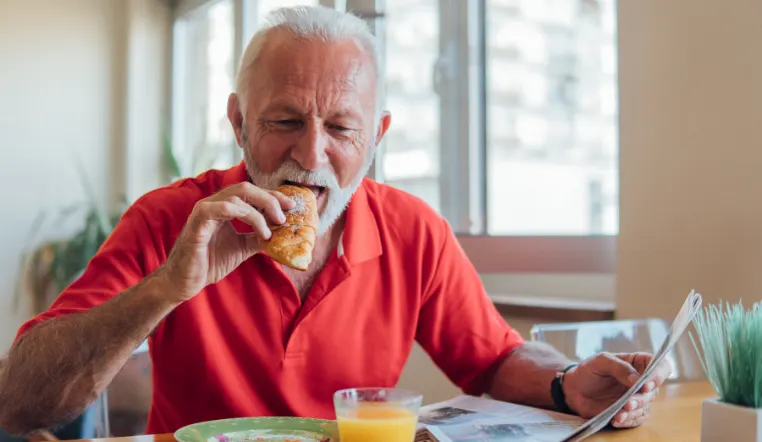Have you or your loved one lost weight recently without trying? Here are some helpful tips for healthy senior weight gain, as well as a look at some of the underlying issues the sudden weight loss may indicate.
How to Help Older Adults Gain Weight in a Healthy Way
If you or your parent is struggling with unintended weight loss, there are a few things to try. Dieticians recommend these healthy weight gain tips:
- Eat smaller meals but more frequently (perhaps five or six instead of the more typical three meals a day).
- Eat foods with the right texture. Softer foods can help if your parent has dentures or issues swallowing.
- Exercise regularly to increase appetite. Try these exercise ideas for older adults!
- Eat high calorie, high protein foods.
- Try nutritional supplements. However, it’s best to check with your parent’s physician first to see if they recommend this option and, if so, which ones they would suggest.
- Share meals with your parent whenever possible to make them more enjoyable.
- Cook meals ahead for your parent if they are cooking less for themselves.
Foods that Are Good For Healthy Weight Gain for Seniors
As mentioned above, eating foods that are high in calories and protein is a healthy way to gain weight. Here are some healthy weight gain foods for your senior parent:
- Eggs
- Meat
- Poultry
- Nuts
- Whole milk
- Avocados
- Olive oil
- Bananas
- Granola
- Whole grain breads
- Corn
Many experts also recommend adding foods with higher calorie counts to meals your parent enjoys. For example, registered dietitian Anne Myers-Wright recommends:
- adding cheese to salads, soup and sandwiches
- adding sour cream, butter and oils to meals, vegetables, bread and potatoes
- adding cream or full-fat yogurt to desserts, fruit and cereals
- adding creamy sauces and dressings at meals
Healthy Weight Gain Tip: Steer Clear of Fast Food
If you or your parent is looking to gain weight, fast food may cross their minds as a viable option. After all, it certainly falls into the “high calorie” category.
However, relying on fast food for weight gain is not good for their long-term health. Although a fast food meal every now and then won’t hurt, studies show that frequent consumption of fast foods increases the risk of diabetes and cardiovascular disease.
What Causes Weight Loss in Seniors?
Unintended weight loss is an issue many seniors in the United States face. In fact, medical experts say that “unintentional or involuntary weight loss is a common phenomenon among older adults, with an annual incidence of approximately 13%.”
There many potential reasons why your parent may be losing weight, including:
- Illness
- A flare-up of a chronic disease
- Dementia or confusion
- Constipation
- Medication-related issues (some medications may come with side effects of decreased appetite or weight loss, or may cause taste disturbances)
- Decreased desire or ability to cook
- Chewing or swallowing issues
- Reduced appetite
- Depression
It’s very important to identify what’s at the root of your parent’s weight loss issue. If it’s something like decreased appetite or difficulty preparing meals, you can try the above tips to help your parent regain some of their lost weight.
However, you should consult with a doctor if the weight loss is rapid and unexplained. Your parent may have a medical condition that’s behind the sudden weight loss.
It may be time to consider or long-term care communities. If your parent is struggling to cook for themselves or is losing weight without trying to, it may be one of the common warning signs that a senior needs more help .
More Caregiver Tips for Your Senior Parent
If you’d like to learn more about how to stay safe and healthy, read our caregiver blog. It’s full of helpful, practical tips for adult children who are trying to figure out how best to care for their parent.[/vc_column_text][/vc_column][/vc_row]


